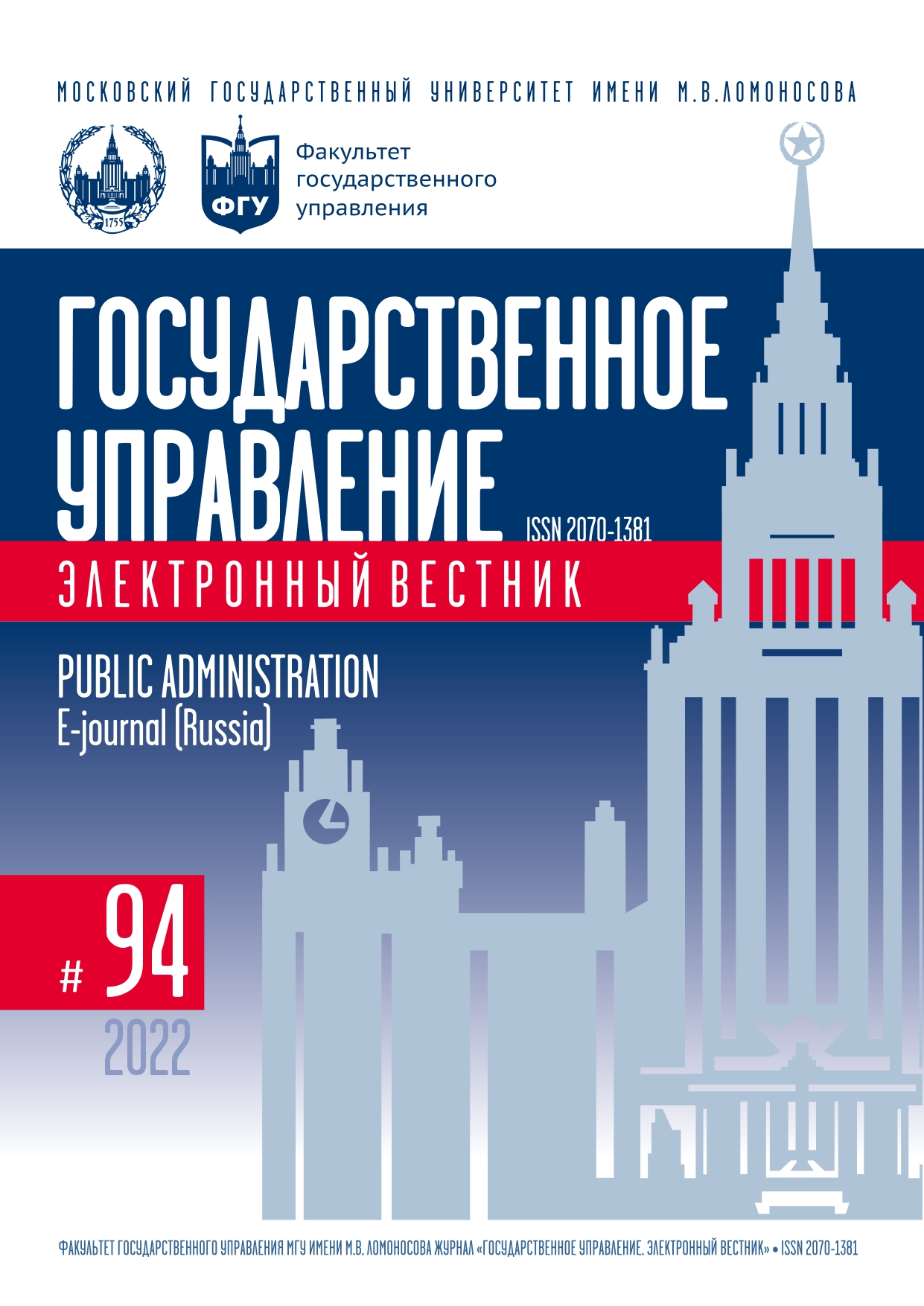Technologies of Higher Education Internationalization in Modern Conditions
Keywords:
Global education market, internationalization of higher education, social management technology, Eurasian space, integration, innovation, networking, transformation, soft power, knowledge diplomacy, academic mobility, digitalization, globalization, competitivenessAbstract
The article considers the technology of internationalization of modern higher education as the most important management process implemented using digital tools, using network forms of interaction, principles of soft power and knowledge diplomacy. Integration trends of the European and actively developing Eurasian educational space are analyzed. It is shown that modern international cooperation in the field of higher education is implemented in network communications of strategic partner organizations of different states based on the compatibility of goals, resources, interests, influence tools, and organizational practices. The key principles of the higher education system are outlined, a multivariant model of higher education is considered, and levels of education demanded by foreign students in the new conditions of transformation in the national system of higher education in Russia are analyzed. Furthermore, changes in the system of organization of higher education in Russia after the introduction of the Bologna system, as well as the problems of undergraduate students in the labor market are shown. The positive and negative results of applying soft power principles in the field of higher education are analyzed and basic characteristics of knowledge diplomacy, its tools, possibilities of implementation during of changing vectors period of academic mobility and reorientation of educational communications are considered. As a result, it is shown that main mechanisms/tools for the internationalization of higher education as a social management technology are: joint/network universities, university consortiums, foreign branches of universities, rectors’ forums, international inter-university associations, joint educational programs with the issuance of two diplomas.
References
Антонова Н.Л., Сущенко А.Д., Попова Н.Г. «Мягкая сила» высшего образования как фактор мирового лидерства // Образование и наука. 2020. Т. 22. № 1. С. 31–58. DOI: 10.17853/1994-5639-2020-1-31-58
Байденко В.И. Болонский процесс: в преддверии третьего десятилетия // Высшее образование в России. 2018. Т. 27. № 11. С. 136–148. DOI: 10.31992/0869-3617-2018-27-11-136-148
Иноземцева К.М. Интернационализация высшего профессионального образования в России: языковая политика // Высшее образование в России. 2014. № 5. С. 145–152.
Камынина Н.Р., Грудзинский А.О. Россия в болонском процессе: цель — повышение конкурентоспособности высшего образования // Высшее образование в России. 2017. № 8–9. С. 22–31.
Логунова Л.Б. Цифровая революция: школа как лаборатория социальной реконструкции // Сборник XVI Международной конференции «Государственное управление Российской Федерации: повестка дня власти и общества». М.: ООО «Издательский дом КДУ», 2019. С. 54–59.
Лукичев Г.А. Международные правовые акты и документы по развитию европейской интеграции в образовании и исследованиях. М.: Готика, 2004.
«Мягкий путь» вхождения российских вузов в Болонский процесс / под ред. А.Ю. Мельвиля. М.: ОЛМА-ПРЕСС, 2005.
Ромм М.В., Заякина Р.А., Филатова Е.В., Лучихина Л.Ф., Ильин С.Е. Инновационный вуз: сетевая перспектива в партнерских сообществах. Новосибирск: НГТУ, 2018.
Титаренко Л.Г. Место и роль интеграции систем высшего образования в международном сотрудничестве стран ЕАЭС // Большая Евразия: Развитие, безопасность, сотрудничество. 2018. № 1–2. С. 319–321.
Ткач Г.Ф., Сенашенко В.С. Болонский процесс: Обзор эволюции приоритетов и промежуточные итоги // Высшее образование в России. 2015. № 7. С. 119–130.
Фатыхова В.М. Евразийское сотрудничество в области науки и высшего образования: перспективы неофункционального «перетекания» // Вестник МГИМО-Университета. 2019. № 2 (65). С. 159–175. DOI: 10.24833/2071-8160-2019-2-65-159-175
de Oliveira Barbosa M., Baeta Neves E. Internationalization of Higher Education: Institutions and Knowledge Diplomacy // Sociologias. 2020. Vol. 22. Is. 54. P. 22–44. DOI: 10.1590/15174522-104425
de Wit H., Altbach P. Internationalization in Higher Education: Global Trends and Recommendations for Its Future // Policy Reviews in Higher Education. 2021. Vol. 5. Is. 1. P. 28–46. DOI: 10.1080/23322969.2020.1820898
de Wit H., Altbach P. Unprecedent Challenges, Significant Possibilities // International Higher Education. 2020. Vol. 100. P. 3–4.
Kadushin C. Understanding Social Networks: Theories, Concepts and Findings. New York: Oxford University Press, 2012.
Khomyakov M., Dwyer T., Weller W. Internationalization of Higher Education: Excellence or Network Building? What Do BRICS Countries Need Most? // Sociologias. Vol. 22. Is. 54. 2020. P. 120–143. DOI: 10.1590/15174522-99066
Knight. J. Internationalization: Elements and Checkpoints // CBIE Research. Canadian Bureau for International Education. 1994. Is. 7. URL: https://files.eric.ed.gov/fulltext/ED549823.pdf
Knight. J. Internationalization Remodeled: Definition, Approaches, and Rationales // Journal of Studies in International Education. 2004. Vol. 8. Is. 1. P. 5–31. DOI: 10.1177/1028315303260832
Knight J. The Potential of Knowledge Diplomacy. Higher Education and International Relations // A Wealth of Nations: 27th Annual EAIE Conference. Glasgow, 15–18 September, 2015. Glasgow: EAIE, 2015. P. 37–45.
Knight J. Knowledge Diplomacy: What Are the Key Characteristics? // International Higher Education. 2020. Is. 100. P. 37–44.
Nye J.S. Get Smart: Combining Hard and Soft Power // Foreign Affairs. 2009. Vol. 88. Is. 4. P. 160–163.
Nye J.S. Soft Power: The Means to Success in World Politics. New York: Public Affairs. 2004.
Wellman B., Frank K. Network Capital in a Multi-Level World: Getting Support in Personal Communities // Social Capital: Theory and Research / ed. by N. Lin, K. Cook and R. Burt. Chicago: Aldine DeGruyter, 2000. P. 233–274.
Wojciuk A., Michałek M., Stormowska M. Education as a Source and Tool of Soft Power in International Relations // European Political Science. 2015. Vol. 14. Is. 3. P. 298–317. DOI: 10.1057/eps.2015.25

